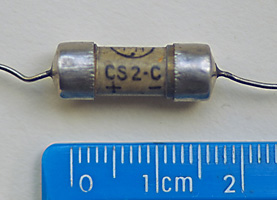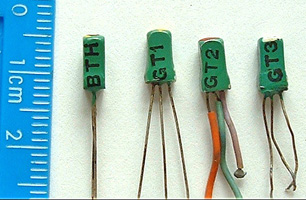'From 1946 to 1954 I worked in the Electronics Department of BTH, Rugby, on a Classified airborne system intended for the RAF. Around 1948 I worked in a wooden Hut on the flat roof of the Research Laboratory, (we were running out of space at the time). My hut was shared by Ruth Hull, who was doing calculations on electrostatic and electromagnetic lenses for Dennis Gabor, who worked in another hut on the same roof. In yet another wooden hut was Kinman, whose first name I don't remember. (This was Thomas Hilary Kinman. - Andrew W.) He was part of the Scheme For Oliphant (SFO). Oliphant was the professor at Birmingham who originated the 10 cm and 3cm Radar work round the Randall & Boot Magnetron . An essential part of that system was a small germanium diode which lived in a stub off the main waveguide to monitor the behaviour of the magnetron.
Kinman designed the germanium diodes and at the time was the worldwide authority on extracting pure germanium by the melt and freeze on extraction process. Shockley, Bardeen and Brattain at Bell labs needed pure germanium for their transistors. Brattain came to visit Kinman, who showed him how to extract pure germanium. In return, Brattain gave Kinman the information on how to make transistors. There were no written agreements, no exchange of money.
Our project was interested in these transistors. At first sight they might give us a way of cutting down the vast weight and heat of our airborne equipment. I was commissioned to investigate. The experimental transistors that Kinman produced had two cat's whiskers on either side of a differentially doped piece of germanium. They cost the Ministry of Aviation about £10 each, at a time my princely salary was £5 per week, and blew up faster than any protective circuits I could devise.( At the time the production cost of a vacuum tube, a valve, was about 6d). In addition they were very slow compared to vacuum tubes. I consulted Kinman and all the relevant chemists in the Research Laboratory. Silicon, I was told, would be faster, but Silicon transistors would, if possible to make, always be prohibitively expensive.
I wrote a definitive paper showing that transistors would never be of use in real time systems........'
Harry Metcalfe, March 2008.

